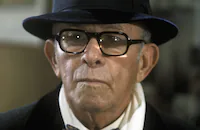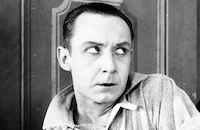Many Happy Returns
Brief Synopsis
Cast & Crew
Norman Mcleod
Guy Lombardo And His Royal Canadians
Gracie Allen
George Burns
George Barbier
Joan Marsh
Film Details
Technical Specs

Synopsis
When Horatio Allen returns home to New York City from Europe, he finds his Bon Ton Department Store being transformed into a bird sanctuary by his zany daughter Gracie. Horatio's other daughter Florence, meanwhile, has won the "Mystery Girl" beauty contest and a motion picture contract, but Horatio forbids her to go to Hollywood. Gracie intervenes and tears up a contract that bandleader Guy Lombardo has with Horatio's radio station so Guy can appear in Florence's movie. To stop Gracie's incessant meddling, Horatio has her psychoanalyzed, and the doctor prescribes marriage to radio announcer George Burns as medicine. Bon Ton Radio's "Masked Tenor," Ted Lambert, then asks Horatio for Florence's hand in marriage, and Horatio fires him, then bribes George into marrying Gracie by offering ten dollars for each mile they travel on their honeymoon. Gracie and George marry and board a train to the West coast. At the depot, Ted is offered a role opposite Florence in the film, and he and Florence board Gracie's and George's train. While George counts miles in a separate berth from Gracie, Horatio hires two thugs in New York to retrieve Florence and Ted. At the Pasadena depot, the thugs abduct Florence and Ted, and when the train arrives in Hollywood, Gracie and George are hired as the "Mystery Girl" and the "Masked Tenor." Filming begins for the musical murder mystery Murder While the Band Plays , but Gracie ad libs her lines so terribly the producer decides to make her the murder victim instead of the heroine. When Gracie learns of Florence's kidnapping, she offers George's mileage money as ransom for Florence's return. After Florence and Ted are delivered in New York, the thugs arrive at Gracie's to collect the money, and she forces them to confess that Horatio hired them. Gracie gets her father to pay her the $30,000 she had to pay the thugs, and George demands thirty dollars-a-mile to continue his honeymoon with Gracie to Japan.

Director

Norman Mcleod
Cast
Guy Lombardo And His Royal Canadians

Gracie Allen

George Burns

George Barbier

Joan Marsh

Ray Milland
Veloz And Yolanda
Egon Brecher
Stanley Fields
John Kelly

William Demarest
Johnny Arthur

Franklyn Pangborn
Morgan Wallace
Kenneth Thomson
Larry Adler
John Taylor 2nd
Clark Rutledge
Jack Mulhall
Crew
Claude Binyon
Emanuel Cohen
Sam Coslow
Richard Currier
Cliff Friend
Ray Harris
Arthur Johnston
William Le Baron
Carmen Lombardo
J. P. Mcevoy
Eugene Merritt
Henry Sharp
Keene Thompson
Adolph Zukor

Film Details
Technical Specs

Quotes
Trivia
Notes
Screen Achievements Bulletin and copyright records claim this film was adapted from Lady Mary Cameron's novel My Dayton, Darling (New York, 1933), although Motion Picture Herald lists the source as her story "Often a Bridegroom," which was the film's working title. Motion Picture Herald lists the film as a box-office "champion" of June 1934. Motion Picture Herald lists Jack Mulhall in the role of "Otto," but this is probably a mistake as Egon Brecher played the part of Dr. Otto von Strudel and was not listed in the Motion Picture Herald cast. Motion Picture Herald also erroneously lists John Arthur's character as "Davis." The Hollywood Reporter review states that at the Pomona, CA preview on April 19, 1934, the audience burst into applause at the sight of George Burns's and Gracie Allen's names, "a rare demonstration there."












